The business of environmental services keeps evolving into something more akin to a real business function, and less like an onerous duty. The trend is driven partly by conscience and partly by receptivity to change.
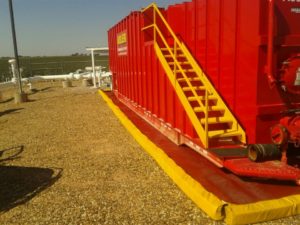 The days in which “environmental” was a dirty word in the oil patch are long gone, say the experts. More and more operators are not just obeying the letter of the law in regulations, but are actively pursuing cleaner operations.
The days in which “environmental” was a dirty word in the oil patch are long gone, say the experts. More and more operators are not just obeying the letter of the law in regulations, but are actively pursuing cleaner operations.
But, like everything else, the environmental business itself follows the overall oil and gas economy.
“For most part, we’ve found that our business tends to follow the price of oil,” said Carol Van Zandt Jones, founder and principal at VZ Environmental. Opened for business in the fall of 2009 in Ft. Worth, the company now has five locations, including one in Midland.
“If there’s a sudden drop,” she continued, “then a month or two later, then we’ll see a drop.”
Sometimes there’s a decline in the fourth quarter of the year, when budgets are spent—except in boom times. “In boom time years, they just keep plowing through—we love those years, of course.”
Current uncertainties and incremental drops in drilling activity have yet to exert a significant effect on VZ’s business, but as the fourth quarter of 2019 arrives, that could change.
One thing that has helped VZ and others in the sector is the improvement in environmental concerns by producers, especially the majors and larger independents.
“When we started doing this, there was a huge percentage of companies that wouldn’t even consider putting out containment to minimize their footprint,” Jones said. “Then there were those that wanted their customers to know that they were operating as green as possible.” The latter were the clean pioneers, she said, because few others were willing to spend money on containment when it was not the norm.
Now, however, “The majority of companies do take that very seriously,” making sure to put containment under any equipment that could cause a toxic spill. “It has become a necessary item in the oil and gas industry.”
Some might attribute this good citizenship to regulations, but Jones argues that “it’s really being tended to by conscience of the men and women in the field.” A shortage of inspectors from regulatory agencies has left most compliance up to the consciences of the field personnel, who for the most part are happy to comply “because it is the right thing to do,” Jones said.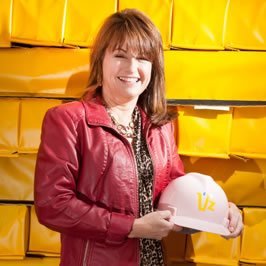
And while larger operators have led the way, due at least in part to public image and stockholder pressures, Jones finds smaller companies taking responsibility as well—although there it takes a different form.
“The smaller ones are doing it, for the most part—sometimes they’ll let the service providers do it on their own,” she observed. “The bigger ones take it into their own hands.”
VZ is another company on the list of those who are challenged to find and keep staff in the Permian Basin, but Jones has some work-arounds. All five of their locations are within 450 miles of the Ft. Worth headquarters, allowing the company to temporarily shift extra people to the Permian to relieve workloads without sending anyone a long way from home.
Generally they try to avoid requiring long stays away from home—something Jones says sets her company apart—which they tout in recruiting new people. When they do send staff to the Permian, she says they usually don’t mind a few days here because “It gives them an extra jingle in their pocket.”
A downturn for some turns to a startup for VZ
If it were not for the 2009 downturn that hit the Barnett Shale particularly hard, there might not be a VZ Environmental today.
“The company I was working for [in Ft. Worth] closed their offices in the Barnett Shale, which is where I was,” she said, which left the entire office without jobs. “I also had some customers that were still working and one of the things they needed was containment.”
She ran that idea past a family friend who helped her develop an effective containment solution. She started her own company selling those containment solutions just in the Barnett.
Those customers began to trickle out of the Barnett into another gas play, the Marcellus—and they asked Jones to supply containment for them in Pennsylvania as well.
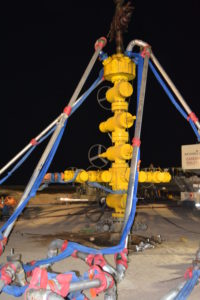 At the same time, the Barnett stragglers wanted her to add an environmental rental service. Because almost everyone else had left or closed up, as had her previous employer, she saw another opportunity.
At the same time, the Barnett stragglers wanted her to add an environmental rental service. Because almost everyone else had left or closed up, as had her previous employer, she saw another opportunity.
A manager at her previous employer who had also lost a job had opened a service company in the Barnett—and the two boosted efficiencies by sharing employees. About that time the Eagle Ford began to open up, so the manager shuffled off to South Texas. Some of Jones’s own customers wanted her to help them there as well, so VZ opened a third office, in La Vernia, continuing to share labor with the former coworker.
“Shortly thereafter the Permian starting lighting up again, and also Oklahoma, so we opened up our Permian Basin yard and Oklahoma yard almost at the same time,” she recalled.
Then—as the downturn of 2014-16 put most basins into a tailspin—they took the opportunity to round up some equipment that was suddenly idled, to open a yard in Marshall, Texas, in the Haynesville-Bossier region. This was an area they had targeted before, but were unable to create time to do so during the boom.
The bust also aided their hiring efforts. “We were able to get some good talent because, during a downturn, there’s plenty of good talent available,” she said.
Opening the new office at that time also helped VZ get through the bust without any major layoffs, which Jones said was nice.
Elaborating on Jones’s observation of increased environmental responsibility, Mark Larson, founder and president of Larson and Associates Environmental Consultants, said, “It’s mainly because they’ve got an image to protect. They have investors they need to protect, therefore they try to keep a clean bill of health, so to speak.”
He added that regulators monitor all companies equally, but the majors have an additional layer of responsibility based on stockholder expectations.
Over the last two decades, Larson has seen the industry as a whole move more toward environmental responsibility and other changes in general. “I think the industry as a whole, I’ve seen the industry become more receptive to change,” he said. “Twenty years ago, I think it was less receptive. If somebody came out with a new method or an improvement on something, the industry was not really receptive to making such a drastic change. But as rules have changed, the industry has complied [in recent years].”
The 20-year-old Midland firm’s main focuses include quickly handling day-to-day oilfield spills. “Longer-term projects tend to be groundwater related. Those tend to be a little bit longer term—they take quite a bit of effort to remediate.”
Permitting and air work are also important business sources for the company.
Many people in the oil and gas industry have observed that the downturn of 2014-16 forced companies to embrace technology and other changes in order to become more efficient, as a survival issue. Larson agrees, and feels that this includes environmental issues.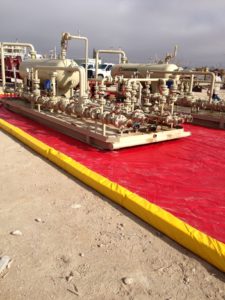
“As technology has improved—and that’s the thing, if they can do things in an economical manner that’s still beneficial to the environment—a company’s a little more receptive to it.”
Technology has also improved reporting functions, allowing most to be done completely electronically, eliminating paperwork. “The State of New Mexico is one of the agencies that, they don’t want to see you submit to them a paper report any more,” he said with a laugh.
Keeping current on regulatory demands is critical, Larson said. “You just have to stay on top of whatever changes are occurring that could potentially affect your clients. The biggest focus recently has just been the beneficial re-use of water.” Improvements on both ends of the spectrum have boosted the use of produced water in fracturing—frac chemicals now require less-treated water, and treatments themselves have become more efficient and less costly.
With the regime change in the 2016 election, some Obama-era regulations have been tabled, primarily in the area of air quality monitoring, said Larson. However, Larson pointed out, not all regulations are left to the federal government. “The TCEQ in Austin is still fairly aggressive, especially on emissions control, from facilities—leak detection, things of that nature.”
University Lands, he said, is particularly vigorous about air quality enforcement for companies operating on their leases. They require operators to “get in line and correct the emission issues—in fact, they’ve got their own FLIR camera for gas monitoring on facilities.” A FLIR camera uses thermal imaging to detect gas emissions and is used in other industries as well.
The state of New Mexico generally has more strict environmental rules than does Texas, starting with the pit rule.
“Ten years ago they came out with a rule that banned the use of lined, open drilling pits unless you have written permission from a landowner,” he said. “They required companies to go to a closed-loop drilling system” in which all waste products are captured and hauled away instead of sitting in open pits.
While the rule was met with great resistance at first, Larson feels few companies would want to go back to the old method now. Over time, the industry made other adjustments to better accommodate closed-loop drilling, making it more palatable.
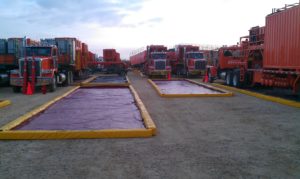 Pressure from without (media, regulatory agencies) and from within (shareholders, feelings of responsibility) are clearly pushing operators and service companies toward cleaner operations. Previous concerns about compliance being overtly costly are being allayed, at least in part, by the efficiencies of technology and by other ways of adapting to regulatory procedures.
Pressure from without (media, regulatory agencies) and from within (shareholders, feelings of responsibility) are clearly pushing operators and service companies toward cleaner operations. Previous concerns about compliance being overtly costly are being allayed, at least in part, by the efficiencies of technology and by other ways of adapting to regulatory procedures.
As with most industries, changes are hitting oil and gas at a faster and faster clip. Accepting or embracing change seems to be a major key to survival.
Paul Wiseman is a freelance writer in Midland.









